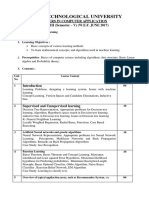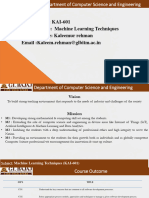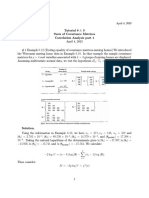Machine Learning Syllabus
Uploaded by
mrameshmeMachine Learning Syllabus
Uploaded by
mrameshmeCS8082 MACHINE LEARNING TECHNIQUES L T P C
Objectives: 3 0 0 3
· To understand the need for machine learning for various problem solving
· To study the various supervised, semi-supervised and unsupervised learning algorithms in machine
learning
· To learn the new approaches in machine learning
· To design appropriate machine learning algorithms for problem solving
UNIT I INTRODUCTION 9
Learning Problems – Perspectives and Issues – Concept Learning – Version Spaces and Candidate
Eliminations – Inductive bias – Decision Tree learning – Representation – Algorithm – Heuristic
Space Search.
UNIT II NEURAL NETWORKS AND GENETIC ALGORITHMS 9
Neural Network Representation – Problems – Perceptrons – Multilayer Networks and Back
Propagation Algorithms – Advanced Topics – Genetic Algorithms – Hypothesis Space Search –
Genetic Programming – Models of Evaluation and Learning.
UNIT III BAYESIAN AND COMPUTATIONAL LEARNING 9
Bayes Theorem – Concept Learning – Maximum Likelihood – Minimum Description Length Principle
– Bayes Optimal Classifier – Gibbs Algorithm – Naïve Bayes Classifier – Bayesian Belief Network –
EM Algorithm – Probability Learning – Sample Complexity – Finite and Infinite Hypothesis Spaces –
Mistake Bound Model.
UNIT IV INSTANT BASED LEARNING 9
K-Nearest Neighbour Learning – Locally weighted Regression – Radial Bases Functions – Case Based
Learning.
UNIT V ADVANCED LEARNING 9
Learning Sets of Rules – Sequential Covering Algorithm – Learning Rule Set – First Order Rules –
Sets of First Order Rules – Induction on Inverted Deduction – Inverting Resolution – Analytical
Learning – Perfect Domain Theories – Explanation Base Learning – FOCL Algorithm –
Reinforcement Learning – Task – Q-Learning – Temporal Difference Learning.
Total Periods: 45
Outcomes:
At the end of the course, the student will be able to:
1. Differentiate between supervised, unsupervised, semi-supervised machine learning approaches
2. Apply specific supervised or unsupervised machine learning algorithm for a particular problem
3. Analyse and suggest the appropriate machine learning approach for the various types of problem
4. Design and make modifications to existing machine learning algorithms to suit an individual
application
5. Provide useful case studies on the advanced machine learning algorithms
Text Books:
1. Tom M. Mitchell, "Machine Learning", McGraw-Hill Education (India) Private Limited, 2013
Reference Books:
1. Ethem Alpaydin, “Introduction to Machine Learning (Adaptive Computation and Machine
Learning)”, The MIT Press 2004.
2. Stephen Marsland, “Machine Learning: An Algorithmic Perspective”, CRC Press, 2009.
You might also like
- Reliability & Maintainability Engineering Ebeling Chapter 4 Book Solutions - Time-Dependent Fa PDFNo ratings yetReliability & Maintainability Engineering Ebeling Chapter 4 Book Solutions - Time-Dependent Fa PDF25 pages
- Integrated Mathematics Multiple Choice QuestionsNo ratings yetIntegrated Mathematics Multiple Choice Questions8 pages
- CS3491 ARTIFICIAL INTELLIGENCE AND MACHINE LEARNIN.docx syllabusNo ratings yetCS3491 ARTIFICIAL INTELLIGENCE AND MACHINE LEARNIN.docx syllabus1 page
- R18B Tech MinorIVYearISemesterTENTATIVESyllabusNo ratings yetR18B Tech MinorIVYearISemesterTENTATIVESyllabus22 pages
- Machine Learning Techniques (Askbooks.net)No ratings yetMachine Learning Techniques (Askbooks.net)163 pages
- Course Code CSA400 8 Course Type LTP Credits 4: Applied Machine LearningNo ratings yetCourse Code CSA400 8 Course Type LTP Credits 4: Applied Machine Learning3 pages
- Handout - BITS-F464 - Machine - Learning - August 2019No ratings yetHandout - BITS-F464 - Machine - Learning - August 20194 pages
- M.E. Computer Science and Engineering - Curriculum - R2019 PageNo ratings yetM.E. Computer Science and Engineering - Curriculum - R2019 Page2 pages
- Machine Learning Techniques Unit-1 (KAI-601)No ratings yetMachine Learning Techniques Unit-1 (KAI-601)78 pages
- Sample Paper Machine Learning Techniques KCS055No ratings yetSample Paper Machine Learning Techniques KCS0555 pages
- CP5191 Machine Learning Techniques L T P C3 0 0 3No ratings yetCP5191 Machine Learning Techniques L T P C3 0 0 37 pages
- Machine Learning Technique (Distinylearn.com)No ratings yetMachine Learning Technique (Distinylearn.com)163 pages
- A SURVEY ON MACHINE LEARNING ALGORITHMS TECHNIQUES ANDNo ratings yetA SURVEY ON MACHINE LEARNING ALGORITHMS TECHNIQUES AND6 pages
- Machine Learning (R17A0534) Lecture Notes: B.Tech Iv Year - I Sem (R17) (2020-21)No ratings yetMachine Learning (R17A0534) Lecture Notes: B.Tech Iv Year - I Sem (R17) (2020-21)9 pages
- Machine Learning Syllabus BCA Eight SemesterNo ratings yetMachine Learning Syllabus BCA Eight Semester2 pages
- Ec8491 Communication Theory UNIT I Amplitude Modulation 9No ratings yetEc8491 Communication Theory UNIT I Amplitude Modulation 91 page
- An Insight Into Embedded System Design: Pantech Solutions PVT LTD Chennai-17No ratings yetAn Insight Into Embedded System Design: Pantech Solutions PVT LTD Chennai-1783 pages
- 4th Floor, EVK Sampath Maaligai, DPI Compound, College Road, Chennai 600 006No ratings yet4th Floor, EVK Sampath Maaligai, DPI Compound, College Road, Chennai 600 00623 pages
- Electronics and Communication EngineeringNo ratings yetElectronics and Communication Engineering3 pages
- Modular Approach: Its Effect On Learners' Reading Attitude and Proficiency in The New NormalNo ratings yetModular Approach: Its Effect On Learners' Reading Attitude and Proficiency in The New Normal36 pages
- Customer Segmentation in Python Chapter3No ratings yetCustomer Segmentation in Python Chapter325 pages
- Business Mathematics and Statistics: Dr. Muhammad Arif HussainNo ratings yetBusiness Mathematics and Statistics: Dr. Muhammad Arif Hussain39 pages
- Statistics: Week 5 Continuous Probability DistributionsNo ratings yetStatistics: Week 5 Continuous Probability Distributions31 pages
- 8 Casual Research and Experimental DesignNo ratings yet8 Casual Research and Experimental Design10 pages
- HW Lesson 5 - MAA HL - Statistics 1 DP1No ratings yetHW Lesson 5 - MAA HL - Statistics 1 DP119 pages
- IELTS - Task 2 - Sample - Books and InternetNo ratings yetIELTS - Task 2 - Sample - Books and Internet1 page
- Lesson 6 Measures of Relative Dispersion Power PointNo ratings yetLesson 6 Measures of Relative Dispersion Power Point8 pages
- Probability and Statistics: Question BankNo ratings yetProbability and Statistics: Question Bank15 pages



































































































